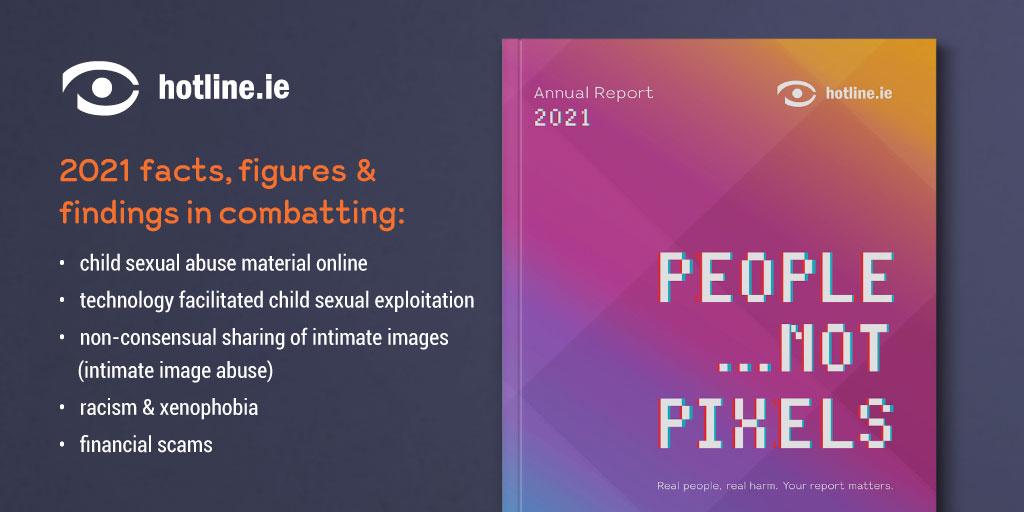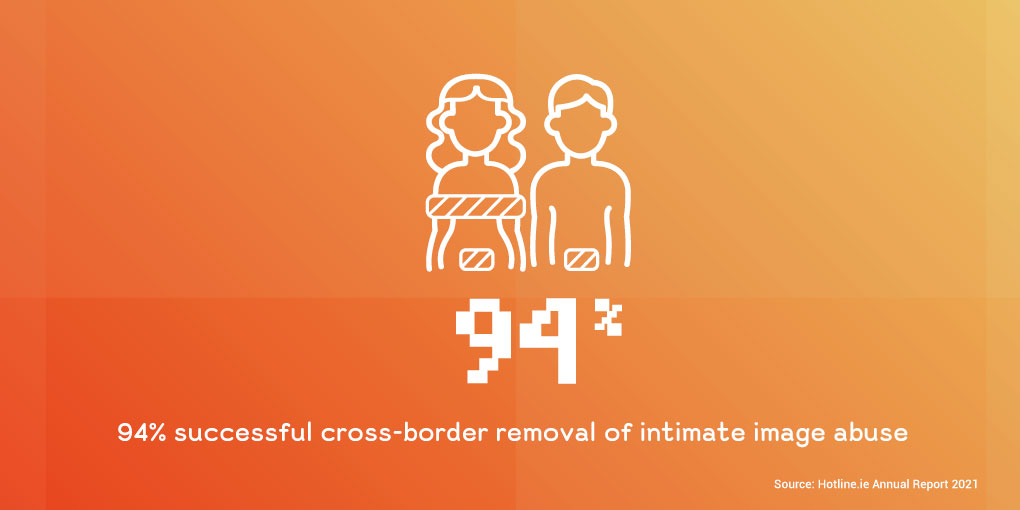25% more child sexual abuse material removed than in the previous 21 years combined
Hotline.ie, the Irish national centre combatting illegal content online, announces the launch of its 2021 Annual Report: People Not Pixels. The team at Hotline.ie works each and every day to reduce the prevalence of illegal content online, break the cycle of abuse and exploitation, and prevent repeat-victimisation of those who have suffered from abuse.
Hotline.ie’s CEO Ana Niculescu, said: “2O21 has been probably the most onerous year in Hotline.ie’s 22-year of operations. When I joined the Irish not-for-profit in 2013, the volume of public reports received that year amounted to 2,568 with 185 reports classified as illegal under Irish law and actioned. Throughout 2021, the small team at Hotline.ie assessed, classified, and actioned 29,794 publicly sourced reports, this is as many reports as the previous three years combined. Half of these reports, which in many cases contained thousands of items, were classified as illegal under Irish law and actioned for removal from the Internet.”

People Not Pixels, Hotline.ie 2021 Annual Report, key insights reveal:
Child sexual abuse material and exploitation online (CSAM):
- In 2021, Hotline.ie classified 14,772 publicly sourced reports as child sexual abuse material online, that is 25% more material classified and removed than in the previous 21 years combined.
- 1 in 4 CSAM reports found to also contain images/videos which appeared to have been generated by children themselves, with indicators of grooming or coercion by adults, particularly in the video material, such as a child receiving compliments, instructions or even threats (over video chat, other times from someone present in the room whilst not visible on camera).
- 9% of CSAM reports also contained computer generated or drawn content depicting gross child sexual abuse, which is illegal under Irish law. This type of “virtual” material has steadily increased over the last five years, with 2021 being an all-time high.
It is a concerning trend as it seeks to normalise the consumption of child sexual abuse imagery; in an attempt to desensitize from the physical and psychological harm suffered by real children who suffer from sexual abuse and exploitation.
- Sexual abuse images and videos of children aged 4 to 12 years old is most prevalent, accounting for 66%, with levels of severity ranging from explicit sexual activity of a child to penetrative sexual assault of a child by an adult, to sadistic sexual torture and bestiality involving a child.
Intimate image abuse (IIA) also referred to as the non-consensual sharing of intimate images/videos
Note: The Hotline.ie IIA service was launched in Sept 2021, and as such the Annual Report includes an outlier dedicated IIA Section to enable reporting on the first 12 full months of IIA service operations, namely Sept 21 to Sept 22.

- 94% successful cross-border removal of intimate image abuse also known as non-consensual sharing of intimate images or videos.
- In the first 12 months (Sept 2021 to 2022) Hotline.ie received 773 reports under IIA suspicion. As a point of reference, the UK helpline for IIA recorded approximately 500 reports in their first year of operations.
- 525 of reports were actionable, in other words they contained the necessary information required to locate the imagery online (e.g. active and publicly accessible web location where the images and videos were being shared), to assess it, and subsequently removal at source could be effected.
- Preliminary analysis of the reports received to date indicates men seem to be more at risk of falling victim to sextortion (“webcam blackmail” or the threat to expose sexual images). The victims have reportedly been approached over social media, through dating apps or on video-chat services.
- Only 1 in 7 reporters indicated they wished to have the matter referred to An Garda Síochána for law enforcement investigations, along with having the content removed by Hotline.ie.
Other forms of illegal content within Hotline.ie remit:
- 23 incidents of reported racism and xenophobia were successfully removed, with 58% of them relating to posts made through social media platforms.
- 45 websites attempting to scam Irish residents removed.
In welcoming the launch of People Not Pixels Hotline.ie 2021 Annual Report, Minister for Justice Simon Harris TD, said, “This marks another year of the important, worthy and difficult work done by Hotline.ie in providing a means for members of the public to confidentially, anonymously and securely report suspected illegal content online. “Each image is a crime. Each image has a victim, or victims, who have suffered abuse, and who are re-victimised each time their abuse is viewed as it is shared across the globe. We must never become hardened or inured to these figures.”
Hotline.ie’s CEO Ana Niculescu, added: “The human toll these figures represent can be overwhelming, but we can’t afford to look away. “I am proud of the role Hotline.ie has played and will continue to play in eradicating illegal content online. “There is reason to be hopeful with online safety and cybercrime moving up the national and global agenda. It’s crucial for collaborative, multi-stakeholder and multi-disciplinary efforts to continue, for more resources to be invested in systems and services for the protection of children and vulnerable people, to provide justice to victims; and it is imperative to bring greater attention to education, awareness and prevention, to create empowered individuals, society, and community, and ultimately sharpen our response through sustained whole-of-society approach.”
Read the full Hotline.ie 2021 Annual Report, People Not Pixels here also available on https://www.hotline.ie/publications/.
The public is given this advice:
- If you suspect to have stumbled across sexual content of under 18s online, report it to hotline.ie/report
- Provide the exact URL where the suspected imagery is located online.
- You should also report non-photographic child sexual abuse content such as computer generated, drawings, pseudo-photographs etc., these are illegal under Irish law.
- Urgent situations where persons may be in immediate danger should always be reported directly to An Garda Síochána.
- For information, advice and free educational resources addressing a range of online safety issues and concerns please see https://www.webwise.ie





